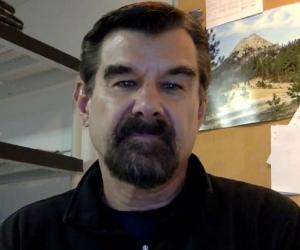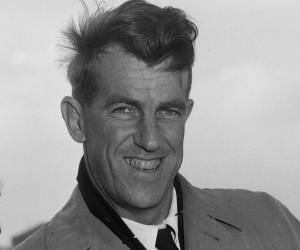Education & Career in Law Enforcement
David Paulides received both his undergraduate and graduate degrees from the University of San Francisco. Curious and intuitive since childhood, he had always aspired to work in law enforcement and be a police officer. So when his student life came to an end, he decided to join the police force. He was trained and posted in Fermont, a small municipality in the San Francisco Bay Area, in 1977.
Three years later, in October 1980, he was transferred to the nearby Jose Police Department where he would spend the rest of his career, nearly two decades, with the force. He held positions in the patrol division of the SWAT Team, Patrol and Street Crimes Unit (street decoy work). He was later promoted to a detective in the Vice/Intelligence Unit.
When he was about to leave SJPD, Paulides received a job offer in the technology sector. He held several lucrative positions, earning much more money than he ever had. He served as an executive whose job was to flush out businesses, investigate their backgrounds and perform due diligence in partnership development and acquisitions.
Continue Reading Below
Career as a Cryptozoologist
Following his retirement from technology, David Paulides received, in his own words, “an unusual offer”. He was provided funding to prove, once and for all, whether Bigfoot really existed or if it was just an elaborate hoax. He accepted and gradually built up a competent and cohesive team to aid him in his investigation. They interviewed hundreds of people who claimed to have seen the creature, gathered numerous DNA samples, and initiated the biggest Bigfoot / Sasquatch DNA study that has ever been done.
He has written two self-published books on the subject, ‘Hoopa Project’ (2008) and ‘Tribal Bigfoot’ (2009), and formed ‘North America Bigfoot Search’, a research group of which he is the current director.
He maintains that the research group orchestrated the search that ultimately led to the hiring of Dr Melba S. Ketchum to helm the study. The team also included Dr P.W. Wojtkiewicz, Dr A.B. Watts, Dr D.W. Spence, Dr A.K. Holzenburg, Dr D.G. Toler, Dr T.M. Prychitko, Dr F. Zhang, Dr S. Bollinger, Dr R. Shoulders, and Dr R. Smith.
Published in January 2013 in the first issue of ‘DeNovo: Journal of Science,’ the paper, titled "Novel North American Hominins, Next Generation Sequencing of Three Whole Genomes and Associated Studies" contained the results of 111 DNA analysis, and stated that a novel hominin hybrid species, also known as "Bigfoot" or "Sasquatch", did exist in North America.
Immediately after publication, the paper faced its first criticism from Sharon Hill of Doubtful News for the Committee for Skeptical Inquiry, who not only questioned the paper but also the legitimacy of DeNovo itself, observing that its website was “clunky” and “amateurish”. According to the ‘The Scientist’ magazine, the geneticists who had gone through the paper were not impressed by it.
The paper, which was written over five years, ultimately failed to change the scientific perception about Bigfoot. It was categorically challenged and received much negative feedback for botched DNA testing and misrepresentation of data. Bigfoot is still believed to be a myth, a construction of the combination of American folklore, errors in recognizing animals and downright falsehood. However, Paulides is adamant that they have indeed proven that the creature truly exists.
His next important work was about the unsolved missing cases in national parks in the US and worldwide. He had originally been asked by a park ranger, who knew about his past works, to look into the questionable nature of some of the missing person cases that occurred in the parks. Paulides insists that he had found multiple lines of evidence that underscored the failure of the park service in finding the missing people. He later expanded his research to a global scale.
He has published six books under the project ‘Missing 411’ to date. They are ‘Western United States & Canada: Unexplained Disappearances of North Americans that have never been solved’ (2011), ‘Eastern United States: Unexplained Disappearances of North Americans That Have Never Been Solved’ (2012), ‘North America and Beyond’ (2013), ‘The Devil's in the Details’(2014), ‘A Sobering Coincidence’ (2015), and ‘Hunters’ (2016). He also wrote and produced the documentary ‘Missing 411’, which was released in 2016.
One of his biggest critics on this has been data analyst Kyle Polich, who hosts the ‘Data Skeptic’ podcast. Polich concluded that there was no unusualness to the so-called unusual disappearances and they could be explained by realistic causes.
Facts About David Paulides
David Paulides is a former police officer who became interested in researching and investigating mysterious disappearances in national parks and wilderness areas.
He is the author of the popular "Missing 411" book series, which explores cases of people who have vanished under unusual circumstances.
Paulides is known for his thorough and methodical approach to investigating these cases, often traveling to remote locations and interviewing witnesses and experts.
He has appeared on various television shows and podcasts to discuss his research and theories about the unexplained disappearances.
Despite facing skepticism and criticism from some quarters, Paulides remains dedicated to raising awareness about these puzzling cases and advocating for improved search and rescue protocols.











